- Home
- Franz Kafka
The Metamorphosis and Other Stories Page 12
The Metamorphosis and Other Stories Read online
Page 12
“Don’t misunderstand the situation,” said the Senator to Karl. “It may be a matter of justice, but it is simultaneously a matter of discipline. Both, and particularly the latter, underlie the Captain’s judgment.”
“So it is,” muttered the stoker. Those who noticed it and understood smiled uneasily.
“We, on the other hand, have already hindered the Captain in fulfilling his official duties, which surely accumulate incredibly, especially upon arrival in New York, so much that it is high time for us to leave the ship, and not to exacerbate things by making an event out of this marginal squabbling between two engineers through our highly unnecessary interference. I understand your course of action, dear nephew, completely, by the way, but that is exactly what gives me the right to lead you away from here in a hurry.”
“I shall have a boat lowered for you at once,” said the Captain, without, to Karl’s amazement, raising even the slightest objection to his uncle’s words, although this could doubtlessly be seen as self-abasement on the part of his uncle. The chief purser rushed hastily to the desk and telephoned the Captain’s order to the boatswain.
“Our time is running out,” Karl said to himself, “but I can’t do anything without offending everyone. I can’t leave my uncle, now that he’s only just found me again. The Captain is in fact polite, but that’s the end of it. His politeness stops when it comes to discipline, and my uncle certainly spoke from the Captain’s heart. I don’t want to speak to Schubal; I’m even sorry that I shook hands with him. And all the other people here are inconsequential.”
And with these thoughts in mind, he walked over to the stoker, pulled his right hand from behind his belt, and held it playfully in his own. “Why don’t you say anything?” he asked. “Why do you put up with it all?”
The stoker only wrinkled his brow, as though he were searching for the expression for what he had to say. Incidentally, he looked down at Karl’s and his hand.
“You’ve been wronged like no one else on this ship, this I know for sure.” And Karl drew his finger back and forth between those of the stoker, who looked around with gleaming eyes as though a joy had been bestowed upon him that no one could resent him for.
“You must defend yourself, say yes and no, otherwise people will have no idea of the truth. You must promise me that you will do as I say, for I myself, I have good reason to fear, will not be able to help you anymore.” And now Karl wept as he kissed the stoker’s hand and took the cracked and almost lifeless hand and pressed it to his cheeks, like a treasure that one must relinquish.—But Uncle Senator was already there at his side and pulled him, albeit with the slightest force, away.
“The stoker appears to have charmed you,” he said and glanced meaningfully over Karl’s head at the Captain. “You were feeling abandoned and then you found the stoker, and are now grateful to him; that is surely quite laudable. But don’t take it too far, at least for my sake, and learn to realize your position.”
Outside the door there was a racket, shouts could be heard, and it was even as though someone were being thrown brutally against the door. A sailor entered, somewhat disheveled, with a girl’s apron tied around his waist. “There are people outside,” he cried and thrust his elbow around once, as though he were still in the crowd. He finally came to his senses and wanted to salute the Captain when he noticed the apron, tore it off, threw it on the floor, and cried: “That’s disgusting, they’ve put a girl’s apron on me.” And then he clicked his heels together and saluted. Someone was about to laugh, but the Captain said sternly: “That’s what I call a good mood. Just who is outside?”
“They are my witnesses,” said Schubal, stepping forward, “My sincerest apologies for their inappropriate behavior. When the crew has the voyage behind them, they are sometimes quite mad.”
“Call them in right away!” ordered the Captain, and immediately turning around to the Senator, he said politely but quickly: “Please, Herr Senator, be so good as to take your nephew and follow this sailor, who will take you to your boat. I need hardly say what a pleasure and honor it has been to personally make your acquaintance, Herr Senator. I only hope that we will soon have the opportunity to continue our interrupted conversation about the state of the American fleet and perhaps be interrupted again in such a pleasant manner as today.”
“One nephew is enough for the time being,” said the uncle laughing. “And now please accept my thanks for your kindness and farewell. It would not be entirely impossible, by the way,”—he took Karl in his arm affectionately—“for us to spend a longer period of time together on our next journey to Europe.”
“That would be a great pleasure,” said the Captain. The two men shook hands. Karl could only manage to briefly shake the Captain’s hand in silence, for the Captain was already preoccupied with the perhaps fifteen people who moved in under Schubal’s lead in a concerned, albeit very loud manner. The sailor asked the Senator’s permission to lead the way and then parted the crowd for him and Karl, who easily passed through the rows of bowing people. It appeared that these otherwise good-natured people regarded Schubal’s quarrel with the stoker as a joke that did not even cease to be amusing in front of the Captain. Karl noticed among them the kitchen maid Line, winking at him playfully as she tied around her waist the apron that had been thrown down by the sailor, for it was hers.
Still following the sailor, they left the office and turned into a short passageway that led them, after a few steps, to a little door, from which a short ladder led down to the boat that had been prepared for them. The sailors in the boat, into which their leader jumped with a single bound, rose and saluted. The Senator was just warning Karl to be careful climbing down, when Karl, still on the topmost rung, broke into heavy tears. The Senator placed his right hand under Karl’s chin and held him tightly, stroking him with his left hand. Closely linked, they slowly descended step by step and entered the boat, where the Senator chose a good seat for Karl directly opposite him. At the Senator’s signal, the sailors pushed off from the ship and were immediately working at full force. They were hardly a few meters from the ship when Karl made the unexpected discovery that they were on the same side of the ship as the windows of the purser’s office. All three windows were filled with Schubal’s witnesses, who greeted and winked in the most friendly way; even his uncle thanked them, and a sailor accomplished the feat of blowing them a kiss without actually interrupting the rhythm of his rowing. It was truly as though the stoker no longer existed. Karl considered his uncle, whose knees were almost touching his own, more closely, and began to doubt whether this man would ever be able to replace the stoker. His uncle also avoided his eyes and looked at the waves, as they surged around their boat.
IN THE PENAL COLONY
"It is a remarkable apparatus," said the officer to the researching traveler as he surveyed the apparatus, which was quite familiar to him, with some measure of admiration. It seemed that it was only out of courtesy that the traveler had accepted the invitation of the commandant, who had called upon him to attend the execution of a soldier who had been condemned for insubordination and insulting a superior. The interest in this execution also did not seem to be very great within the penal colony. Present here, at least, in the deep, sandy little valley enclosed on all sides by barren slopes, in addition to the officer and the traveler, were only he who had been condemned, a dull-witted, wide-mouthed man with unkempt hair and face, and a soldier, who was holding the heavy chain in which all the small chains that fettered the condemned man at his ankles, wrists, and neck were linked to one another with connecting chains. Incidentally, the condemned man looked so doggishly submissive that it appeared as though one could let him run freely around the slopes and would only need to whistle when the execution began for him to return.
The traveler was not particularly interested in the machine and paced with almost visible indifference back and forth behind the condemned man, while the officer attended to the final preparations, one moment crawling under the apparat
us, which was deeply embedded in the ground, the next climbing a ladder to examine the upper parts. These were tasks that could actually have been left to a mechanic, but the officer performed them with great enthusiasm, perhaps because of his particular admiration for this apparatus, perhaps because they could not be entrusted to anyone else for other reasons. “Now everything is ready!” he finally called out and climbed down from the ladder. He was extraordinarily exhausted, breathing with his mouth wide open, and had forced two delicate ladies’ handkerchiefs behind the collar of his uniform. “These uniforms are surely too heavy for the tropics,” said the traveler, instead of inquiring about the apparatus as the officer had expected. “Indeed,” said the officer and washed his hands, which had been soiled with oil and grease, in a nearby bucket of water, “but they mean home; we don’t want to lose our home.—Now have a look at this apparatus,” he added quickly, as he dried his hands on a towel and pointed simultaneously to the apparatus. “Until now, work by hand had been necessary, but from now on the apparatus operates entirely on its own.” The traveler nodded and followed the officer, who sought to prepare himself for all eventualities and then said: “Disturbances do occur, of course; even though I hope it will not happen today, one must nevertheless allow for it. The apparatus should operate continuously for twelve hours, after all. If disturbances do occur, however, they will only be quite minor and repaired immediately.”
“Won’t you have a seat?” he asked finally, pulled one cane chair from a stack, and offered it to the traveler, who could not refuse. He was now sitting on the edge of a pit, into which he threw a fleeting glance. It was not very deep. On one side of the pit, the excavated earth had been piled up to form a parapet, on the other side stood the apparatus. “I don’t know,” said the officer, “whether the commandant has already explained the apparatus to you.” The traveler made an uncertain gesture with his hand; the officer could not ask for more, for now he could explain the apparatus himself. “This apparatus,” he said, grasping a crankshaft and leaning himself against it, “is the invention of our former commandant. I myself participated in the very first experiments and was also involved in all work leading to its completion. The credit for the invention, however, is his alone. Have you heard of our former commandant? No? Well, it is not an overstatement for me to say that the organization of the entire penal colony is his work. We, his friends, already knew at the time of his death that the colony’s organization was so self-contained that his successor, even if he had a thousand new plans in mind, would not be able to alter a thing for at least many years to come. And our prediction has come true; the new commandant was forced to acknowledge as much. It’s such a shame that you did not meet the former commandant!—But,” the officer interrupted himself, “I am rambling while his apparatus is right here before us. It consists, as you see, of three parts. In the course of time, each of these parts has acquired a somewhat vernacular name. The lower part is called the Bed, the upper one is the Scribe, and this hovering part in the middle is called the Harrow.” “The Harrow?” asked the traveler. He had not been listening very attentively; the sun was trapped so intensely by the shadeless valley, it was difficult to gather one’s thoughts. The officer seemed to him all the more admirable, in his fitted, parade-dress uniform, weighted with epaulettes, draped with braids, as he explained his subject with such enthusiasm, and also managed to tighten a few screws here and there with his screwdriver as he spoke. The soldier appeared to be in much the same condition as the traveler. He had wound the chain around both of the condemned man’s wrists, leaned with one hand on his rifle, let his head hang down, and concerned himself with nothing. The traveler was not surprised at this, for the officer was speaking French, and surely neither the soldier nor the condemned man was able to understand French. It was therefore all the more remarkable that the condemned man was nevertheless making an effort to follow the officer’s explanations. With a sort of drowsy tenacity, he always directed his eyes to wherever the officer was pointing, and when he was interrupted by the traveler’s question, he, like the officer, looked at the traveler.
“Yes, the Harrow,” said the officer. “The name fits. The needles are arranged in a harrowlike fashion and the whole thing is operated like a harrow, although only in one place and much more skillfully. Anyway, you will understand how in a moment. The condemned man is laid here on the Bed.—You see, I shall first describe the apparatus before having the procedure itself carried out. You will then be able to follow it better. One of the cogwheels in the Scribe is badly worn; it screeches quite a lot when it is running; one can hardly make oneself understood; unfortunately, replacement parts are difficult to acquire here.—Now, as I said, this is the Bed. It is covered entirely with a layer of padding, the purpose of which you will learn later. The condemned man is laid on his stomach onto this padding, naked, of course; to bind him there are straps, here for the hands, here for the feet, here for the neck. Here at the head of the Bed, where the man, as I said, is at first lying face-down, is this little felt gag that can be easily regulated so that it just fits into the man’s mouth. Its purpose is to prevent screaming and biting of the tongue. Of course the man must take the felt in his mouth or else his neck will be broken by the neck strap.” “That’s padding?” asked the traveler and leaned forward. “Yes, certainly,” said the officer smiling, “feel it for yourself.” He took the traveler’s hand and guided it over the Bed. “It is a specially treated padding, which is why it looks so strange; I’ll get to its purpose in a moment.” The traveler’s interest in the apparatus had already been won a little; his hand protecting his eyes from the sun above, he looked up at the apparatus. It was a large structure. The Bed and the Scribe were the same size and looked like two dark chests. The Scribe was mounted about two meters above the Bed; both were connected at the corners by four brass rods, which were almost radiating in the sunlight. Between the chests, the Harrow was suspended on a steel band.
The officer had hardly noticed the traveler’s previous indifference, but was certainly aware of his growing interest now; hence he paused in his explanations to allow the traveler time for undisturbed inspection. The condemned man imitated the traveler; as he could not place his hand above his eyes, he squinted with his eyes unshaded.
“So now the man is lying down,” said the traveler, leaned back in his chair, and crossed his legs.
“Yes,” the officer said, pushed his cap back a bit and ran his hand across his hot face. “Now listen! Both the Bed and the Scribe have their own electric battery; the Bed needs it for itself, the Scribe for the Harrow. As soon as the man is strapped in, the Bed is set in motion. It vibrates with minute, very rapid convulsions simultaneously from side to side and up and down. You will have seen similar apparatuses in sanatoriums; only with our Bed all movements are calculated exactly; that is to say, they must correspond precisely to the movements of the Harrow. This Harrow, however, has the actual task of executing the sentence.”
“And what is the sentence?” asked the traveler. “You don’t know that either?” said the officer with astonishment and bit his lip: “Forgive me if my explanations are perhaps disorganized; I beg your pardon. The explanations always used to be given by the commandant, you see; now the new commandant has evaded this honorable duty. But such an esteemed visitor,”—the traveler sought to fend off this distinction with both hands, but the officer insisted on the expression—“such an esteemed visitor not even being informed about the form of our sentence is another new development that—.” He had a curse on his lips, but he composed himself and said only: “I was not informed about it; I am not at fault. I am, by the way, certainly the most qualified to explain the types of sentences we pass, for I carry here”—he patted his breast pocket—“the relevant drawings from the hand of our former commandant.”
“Drawings from the hand of the commandant himself?” asked the traveler: “Was he everything all in one man? Was he soldier, judge, engineer, chemist, and draftsman?”
“Ind
eed,” said the officer, nodding his head with a fixed, pensive gaze. Then he scrutinized his hands; they didn’t seem clean enough to him to be handling the drawings; he went to the bucket and washed them again. Then he pulled out a small leather folder and said: “Our sentence does not sound harsh. The order that the condemned man has violated will be inscribed with the Harrow on his body. Using this man as an example,”—the officer pointed at the man—“his body will be inscribed with ‘Honor thy superior!’”
The traveler took a fleeting look at the man; he had bowed his head as the officer had pointed at him and seemed to have gathered all his hearing strength in order to gain some information. But the movements of his thick lips as he pressed them together evidently showed that he could understand nothing. The traveler had wanted to ask several things, but at the sight of the man he asked only: “Does he know his sentence?” “No,” said the officer and was about to continue his explanation when the traveler interrupted him: “He doesn’t know his own sentence?” “No,” said the officer again and hesitated for a moment as though he required the traveler to further justify his question, and then said: “It would be pointless to announce it to him. After all, he will experience it on his own body.” The traveler wanted to remain silent when he felt the condemned man directing his gaze at him; he seemed to be asking if he could condone the described procedure. So the traveler, who had already leaned back, leaned forward again and also asked: “But he does know that he has been condemned, doesn’t he?” “Nor that either,” said the officer and smiled at the traveler as though he were expecting another strange disclosure from him. “No?” said the traveler and wiped his brow, “So then the man still doesn’t know how his defense was received?” “He had no opportunity to defend himself,” said the officer, looking to the side as though he were talking to himself and did not want to embarrass the traveler by telling him these things that were, to him, so obvious. “But he must have had an opportunity to defend himself,” said the traveler, rising from his chair.

 Diaries of Franz Kafka
Diaries of Franz Kafka Metamorphosis and Other Stories
Metamorphosis and Other Stories The Castle: A New Translation Based on the Restored Text
The Castle: A New Translation Based on the Restored Text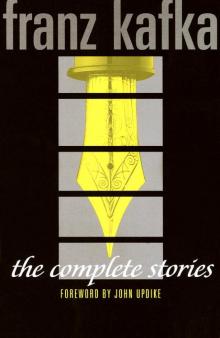 The Complete Stories
The Complete Stories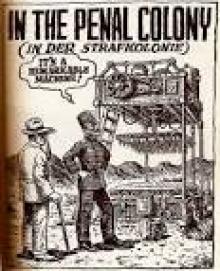 In the Penal Colony
In the Penal Colony The Trial
The Trial Amerika
Amerika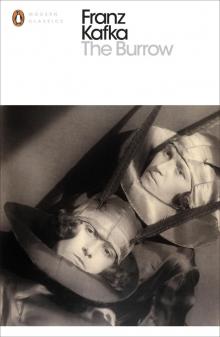 The Burrow: Posthumously Published Short Fiction
The Burrow: Posthumously Published Short Fiction Sons
Sons Letters to Milena
Letters to Milena Investigations of a Dog: And Other Creatures
Investigations of a Dog: And Other Creatures Collected Stories
Collected Stories The Great Wall of China
The Great Wall of China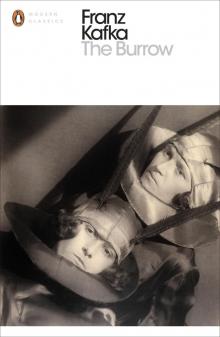 The Burrow
The Burrow The Castle
The Castle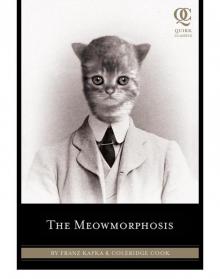 The Meowmorphosis
The Meowmorphosis The Sons
The Sons The Lost Writings
The Lost Writings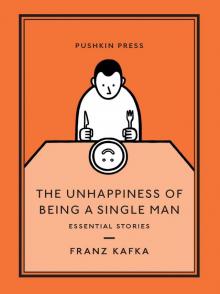 The Unhappiness of Being a Single Man
The Unhappiness of Being a Single Man Amerika: The Missing Person: A New Translation, Based on the Restored Text
Amerika: The Missing Person: A New Translation, Based on the Restored Text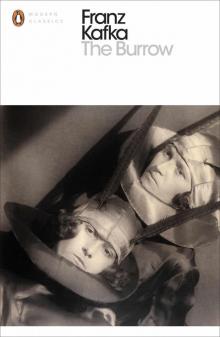 The Burrow: Posthumously Published Short Fiction (Penguin Modern Classics)
The Burrow: Posthumously Published Short Fiction (Penguin Modern Classics) The Diaries of Franz Kafka
The Diaries of Franz Kafka Investigations of a Dog
Investigations of a Dog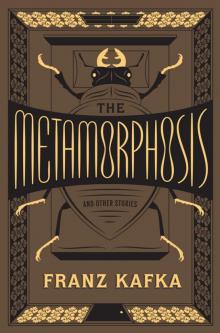 The Metamorphosis and Other Stories
The Metamorphosis and Other Stories The Trial: A New Translation Based on the Restored Text
The Trial: A New Translation Based on the Restored Text